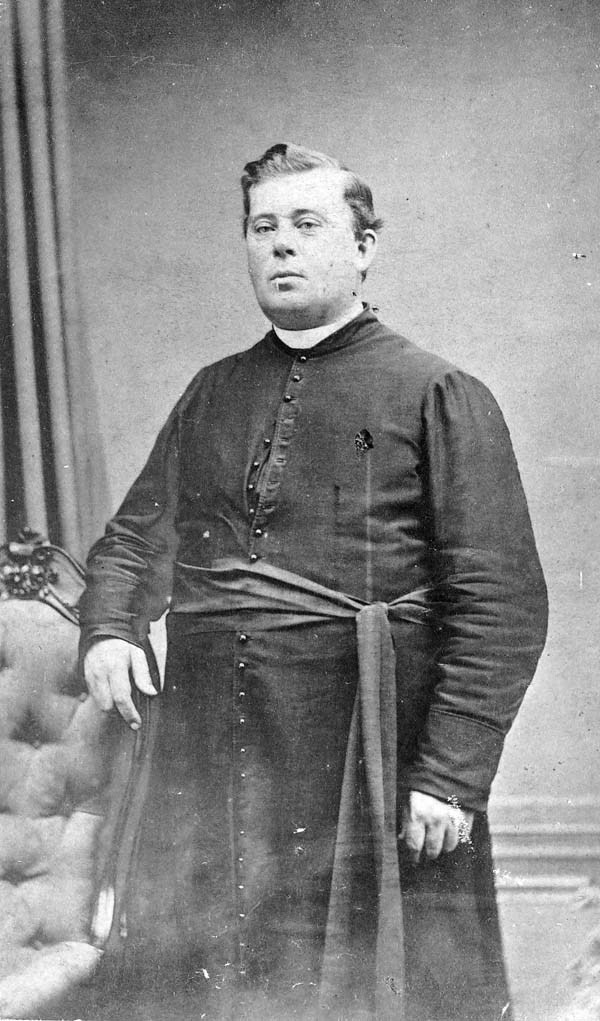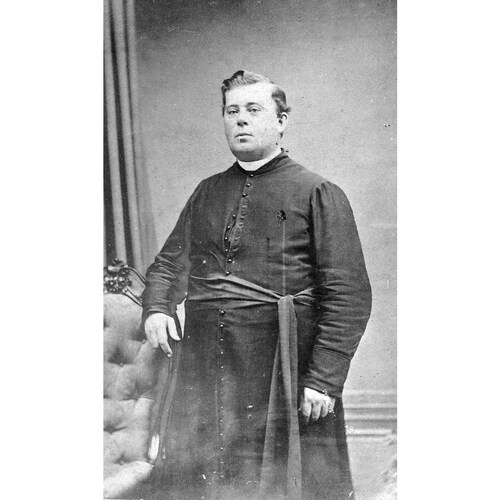
Source: Courtesy of Wikimedia Commons
ALLARD, JOSEPH-THÉOPHILE, Roman Catholic priest; b. 27 Aug. 1842 in Carleton, Lower Canada, son of Pierre Allard, a farmer, and Marie-Gilles (Gillette) Allain; d. 30 Jan. 1912 in Caraquet, N.B.
At the age of 12 Joseph-Théophile Allard was sent to the Séminaire de Nicolet in Lower Canada to do his classical studies. In 1863 he was admitted to the Grand Séminaire de Québec as a theological student. Two years later he went to Memramcook, N.B., where Father Camille Lefebvre* had opened the College of St Joseph, the first Acadian college, in 1864. He completed his education there, while teaching.
In December 1867 Allard was ordained to the priesthood in Saint John by Bishop John Sweeny*. Early the following year he began his priestly career in Caraquet, as curate to the parish priest, Joseph-Marie Paquet*. When Paquet died in 1869, Bishop James Rogers* of Chatham appointed Allard curé of Pokemouche-en-Haut, where he stayed seven years. While caring for his parishioners there, he contracted smallpox. After recovering from this ordeal, he was appointed priest of the parish of Caraquet in 1876.
Allard’s second stay in Caraquet ended abruptly in 1879. A conflict arose between the curé and the nuns of the Congregation of Notre-Dame, who ran the convent that had been opened in 1874. Allard maintained that the convent should provide the girls of Caraquet with a free education, but the nuns refused. The bishop of Chatham settled the dispute by sending Allard to Paquetville, a new settlement whose mother parish was Caraquet.
Like his close and lifelong friend Abbé Marcel-François Richard, Allard was a colonizing priest. He moved from Paquetville to Saint-François-de-Madawaska in 1881 and soon after to Eel River (Eel River Crossing) in northern New Brunswick, where he also maintained a religious presence in the new settlement of Balmoral. In 1885 Bishop Rogers appointed him curé of Caraquet. This was his third stay in the village and it was there that he planned on leaving a legacy to Acadia in the form of a college similar to the ones at Memramcook and at Church Point, N.S. [see Gustave Blanche].
Work on the construction of the Collège du Sacré-Cœur in Caraquet began in 1894. Concerned about his Irish bishop’s negative attitude to the education of Acadians, Allard gave no indication of the use to which the new building would be put, sometimes pretending it was to be a new presbytery. Once the work was completed in 1898, he began looking for a religious community to run the institution. After much effort, he obtained permission from Bishop Rogers to bring in the Eudists, and the college opened in January 1899 with 17 students.
Allard was tireless in promoting the development of his college and participated energetically in two projects for its expansion, one begun in 1901 and the other in 1907. He even went to Ottawa in 1902 to raise funds and succeeded in collecting $565.50. As a token of their gratitude for his endeavours, the Eudists and Prosper Lebastard, the superior of the college, approached the Vatican to get some honour conferred on the good curé. Allard was appointed protonotary apostolic, with the title of monsignor, in 1906. A great celebration was organized at the college in August to mark this appointment.
While the Eudists were running the college he had built, Allard had frequent disagreements with them on the subject of parish revenue. They wanted to use it to guarantee the college’s future, but Allard was opposed to this proposal on the grounds that he had given everything he had, and then some, for the building’s construction. Faced with this situation, the bishop put the Eudists in charge of Saint-Paul parish in Bas-Caraquet, thereby assuring them of a fairly substantial income to carry on their work in the region.
In 1911 Joseph-Théophile Allard underwent an operation in the Hôtel-Dieu at Quebec. He returned to Caraquet, where he died on 30 Jan. 1912. His funeral was held on 7 February, after his heart had been removed, in keeping with his last request. He was a man of great determination and obstinate by nature. Those who had known him remembered him as a priest who had faithfully served the cause of the church and the Acadians in northeastern New Brunswick.
AC, Bonaventure (New-Carlisle), État civil, Catholiques, Saint-Joseph (Carleton), 11 sept. 1842. PANB, MC 318, B, Caraquet, esp. “Appel aux amis de l’éducation en faveur des Acadiens par le révérend Joseph Théophile Allard . . . souscription en faveur du collège Sacré-Cœur recueillie à Ottawa” ([1902]). Soc. Hist. Nicolas-Denys, Centre de Documentation (Shippagan, N.-B.), B.164-1 (Fonds Arthur Gallien), “Notes de Julien Legarrec, c.j.m.” Le Moniteur acadien, 24 déc. 1874. C. A. Blanchard, Caraquet: quelques bribes de son histoire: 1967, année du centenaire ([Caraquet, N.-B.], 1967). Dictionnaire biographique du nord-est du Nouveau-Brunswick (6 cahiers parus, [Bertrand; Shippagan], 1983– ), 4e cahier: 10. Clarence LeBreton, Le collège de Caraquet, 1892–1916 (Hull, Qué., 1991). Marcel Tremblay, 50 ans d’éducation catholique et française en Acadie: Caraquet, 1899–Bathurst, 1949 (Bathurst, N.-B., 1949).
Cite This Article
Clarence LeBreton, “ALLARD, JOSEPH-THÉOPHILE,” in Dictionary of Canadian Biography, vol. 14, University of Toronto/Université Laval, 2003–, accessed November 24, 2024, https://www.biographi.ca/en/bio/allard_joseph_theophile_14E.html.
The citation above shows the format for footnotes and endnotes according to the Chicago manual of style (16th edition). Information to be used in other citation formats:
| Permalink: | https://www.biographi.ca/en/bio/allard_joseph_theophile_14E.html |
| Author of Article: | Clarence LeBreton |
| Title of Article: | ALLARD, JOSEPH-THÉOPHILE |
| Publication Name: | Dictionary of Canadian Biography, vol. 14 |
| Publisher: | University of Toronto/Université Laval |
| Year of publication: | 1998 |
| Year of revision: | 1998 |
| Access Date: | November 24, 2024 |



